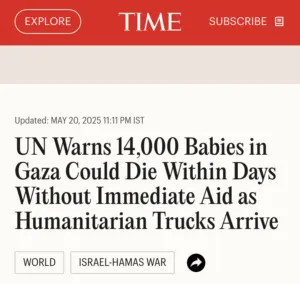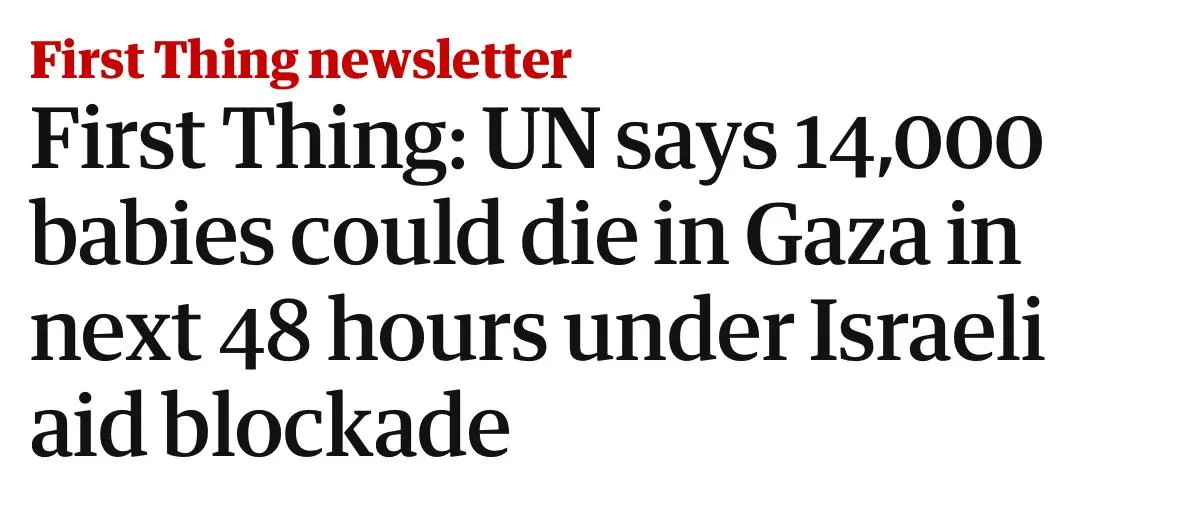RSS
‘14,000 Babies Will Die’: How the UN Invented a Blood Libel — and the Media Ran With It

Trucks carrying aid move, amid a ceasefire between Israel and Hamas, in Rafah in the southern Gaza Strip, Feb. 13, 2025. Photo: REUTERS/Hussam Al-Masri
The New York Times. NBC News. TIME Magazine. The Guardian. ABC News. The Independent.
All these outlets are supposedly reputable news organizations. And all of them published, uncritically, one of the most grotesque and easily disprovable claims made during the war between Israel and Hamas — that 14,000 babies in Gaza would die within 48 hours.
The claim came from Tom Fletcher, the UN humanitarian chief, who said on BBC Radio 4’s Today program: “There are 14,000 babies that will die in the next 48 hours unless we can reach them.”
It was an outrageous statement — one that the BBC, to its credit, at least challenged. Fletcher’s defense? That the UN had “strong teams on the ground” in Gaza. No methodology. No data. Just dramatic moral panic, wrapped in the thin veneer of credibility that comes with a UN badge.
The BBC then followed up with the UN Office for the Coordination of Humanitarian Affairs (UNOCHA), which claimed the number referred to an IPC (Integrated Food Security Phase Classification) report.
There was just one problem: the IPC report says no such thing. It projected that 14,100 children in Gaza could experience acute malnutrition between April 2025 and March 2026 — a year-long period. Not two days. And not imminent death.
BBC journalists acknowledged this discrepancy, stating clearly in a subsequent piece: “The IPC report says this could take place over the course of about a year — not 48 hours.”
UNOCHA spokesperson Jens Laerke was pressed again at a news conference. He offered no figures, no data — just a vague reassurance that “there are babies who are in urgent life-saving need.” Which, while possibly true, is not what his colleague actually claimed.
And yet, despite having verified the 14,000 figure was false, the BBC continued to reprint it across its coverage — in headlines, video segments, and social media posts.
A clip of Fletcher’s interview remains live on the BBC website, without correction, clarification, or context. It even includes a denial from Hamas that it steals humanitarian aid — presented as merely an “Israeli accusation,” despite mountains of documented evidence to the contrary.
The UN’s humanitarian chief claims, without providing evidence, that 14,000 Gazan babies could die in the next 48 hours.
That would be some 27% of the total alleged death toll for this entire war. All babies. All within 48 hours.
This is how anti-Israel libels are spread. https://t.co/io5FJ80Eew pic.twitter.com/FlVqbNXnNh
— HonestReporting (@HonestReporting) May 20, 2025
In its Newshour radio program, the BBC went further, summarizing the story with the line: “14,000 babies in Gaza could die within the next two days without urgent aid” — linking this to Israel’s restrictions on aid to “pressure Hamas.” But of course, the BBC omitted the reason for such pressure: Hamas continues to hold Israeli hostages and refuses to disarm.
While the BBC asked follow-up questions, its acknowledgement that the figure was not supported by evidence was buried.
Other media outlets didn’t even go that far.
The New York Times included the figure in its reporting, with the faint disclaimer that the UN later “appeared to walk back” the claim. But that’s not accurate. The UN didn’t walk anything back. The individual in question doubled down by falsely linking its figure to the IPC report.
TIME Magazine ran the number as a headline, and even linked to the BBC article that had already proven it false. The contradiction? Not mentioned.

ABC News reported the number and misleadingly tied it to Israel’s expanded “assault in Gaza” — falsely implying that Fletcher or the IPC blamed Israel for mass infant deaths.
NBC News took the grotesqueness up a notch. They linked Fletcher’s remark to a controversial comment from Israeli politician and former IDF general Yair Golan, subtly implying the 14,000 babies were about to be killed by Israeli forces.
The Guardian included Fletcher’s incoherent defense but still ran the figure in headlines — in its First Thing newsletter and as a breaking news alert.

The Independent managed to publish two separate pieces on the claim, but only hinted that the number lacked any evidentiary basis. One article even included Fletcher’s remarks paraphrased in such a way as to give them an air of legitimacy: “Asked how the UN worked out that 14,000 babies may die within 48 hours … Mr Fletcher said teams on the ground have been working hard in places such as medical centres and schools to assess need.”
Australia’s 7 News didn’t even bother with attribution. It simply declared: “Gaza crisis threatens 14,000 babies as aid fails to arrive.”
No mention of where the number came from. No verification. Just a headline tailored for outrage.
Let’s be clear: this wasn’t a misunderstanding. It was a grotesque smear — a UN official suggesting, without evidence, that Israel was about to kill 14,000 babies.
And instead of exposing the lie, the world’s most influential media outlets repeated it, amplified it, and headlined it — even after the number was disproven.
This wasn’t journalism. It was narrative laundering — where facts are optional, but outrage is essential.
And it reveals something darker: when the target is Israel, truth becomes negotiable. Lies become headlines. And media accountability is non-existent.
The author is a contributor to HonestReporting, a Jerusalem-based media watchdog with a focus on antisemitism and anti-Israel bias — where a version of this article first appeared.
The post ‘14,000 Babies Will Die’: How the UN Invented a Blood Libel — and the Media Ran With It first appeared on Algemeiner.com.
RSS
After False Dawns, Gazans Hope Trump Will Force End to Two-Year-Old War

Palestinians walk past a residential building destroyed in previous Israeli strikes, after Hamas agreed to release hostages and accept some other terms in a US plan to end the war, in Nuseirat, central Gaza Strip October 4, 2025. Photo: REUTERS/Mahmoud Issa
Exhausted Palestinians in Gaza clung to hopes on Saturday that US President Donald Trump would keep up pressure on Israel to end a two-year-old war that has killed tens of thousands and displaced the entire population of more than two million.
Hamas’ declaration that it was ready to hand over hostages and accept some terms of Trump’s plan to end the conflict while calling for more talks on several key issues was greeted with relief in the enclave, where most homes are now in ruins.
“It’s happy news, it saves those who are still alive,” said 32-year-old Saoud Qarneyta, reacting to Hamas’ response and Trump’s intervention. “This is enough. Houses have been damaged, everything has been damaged, what is left? Nothing.”
GAZAN RESIDENT HOPES ‘WE WILL BE DONE WITH WARS’
Ismail Zayda, 40, a father of three, displaced from a suburb in northern Gaza City where Israel launched a full-scale ground operation last month, said: “We want President Trump to keep pushing for an end to the war, if this chance is lost, it means that Gaza City will be destroyed by Israel and we might not survive.
“Enough, two years of bombardment, death and starvation. Enough,” he told Reuters on a social media chat.
“God willing this will be the last war. We will hopefully be done with the wars,” said 59-year-old Ali Ahmad, speaking in one of the tented camps where most Palestinians now live.
“We urge all sides not to backtrack. Every day of delay costs lives in Gaza, it is not just time wasted, lives get wasted too,” said Tamer Al-Burai, a Gaza City businessman displaced with members of his family in central Gaza Strip.
After two previous ceasefires — one near the start of the war and another earlier this year — lasted only a few weeks, he said; “I am very optimistic this time, maybe Trump’s seeking to be remembered as a man of peace, will bring us real peace this time.”
RESIDENT WORRIES THAT NETANYAHU WILL ‘SABOTAGE’ DEAL
Some voiced hopes of returning to their homes, but the Israeli military issued a fresh warning to Gazans on Saturday to stay out of Gaza City, describing it as a “dangerous combat zone.”
Gazans have faced previous false dawns during the past two years, when Trump and others declared at several points during on-off negotiations between Hamas, Israel and Arab and US mediators that a deal was close, only for war to rage on.
“Will it happen? Can we trust Trump? Maybe we trust Trump, but will Netanyahu abide this time? He has always sabotaged everything and continued the war. I hope he ends it now,” said Aya, 31, who was displaced with her family to Deir Al-Balah in the central Gaza Strip.
She added: “Maybe there is a chance the war ends at October 7, two years after it began.”
RSS
Mass Rally in Rome on Fourth Day of Italy’s Pro-Palestinian Protests

A Pro-Palestinian demonstrator waves a Palestinian flag during a national protest for Gaza in Rome, Italy, October 4, 2025. Photo: REUTERS/Claudia Greco
Large crowds assembled in central Rome on Saturday for the fourth straight day of protests in Italy since Israel intercepted an international flotilla trying to deliver aid to Gaza, and detained its activists.
People holding banners and Palestinian flags, chanting “Free Palestine” and other slogans, filed past the Colosseum, taking part in a march that organizers hoped would attract at least 1 million people.
“I’m here with a lot of other friends because I think it is important for us all to mobilize individually,” Francesco Galtieri, a 65-year-old musician from Rome, said. “If we don’t all mobilize, then nothing will change.”
Since Israel started blocking the flotilla late on Wednesday, protests have sprung up across Europe and in other parts of the world, but in Italy they have been a daily occurrence, in multiple cities.
On Friday, unions called a general strike in support of the flotilla, with demonstrations across the country that attracted more than 2 million, according to organizers. The interior ministry estimated attendance at around 400,000.
Italy’s right-wing government has been critical of the protests, with Prime Minister Giorgia Meloni suggesting that people would skip work for Gaza just as an excuse for a longer weekend break.
On Saturday, Meloni blamed protesters for insulting graffiti that appeared on a statue of the late Pope John Paul II outside Rome’s main train station, where Pro-Palestinian groups have been holding a protest picket.
“They say they are taking to the streets for peace, but then they insult the memory of a man who was a true defender and builder of peace. A shameful act committed by people blinded by ideology,” she said in a statement.
Israel launched its Gaza offensive after Hamas terrorists staged a cross border attack on October 7, 2023, killing some 1,200 people and taking 251 people hostage.
RSS
Hamas Says It Agrees to Release All Israeli Hostages Under Trump Gaza Plan

Smoke rises during an Israeli military operation in Gaza City, as seen from the central Gaza Strip, October 2, 2025. Photo: REUTERS/Dawoud Abu Alkas
Hamas said on Friday it had agreed to release all Israeli hostages, alive or dead, under the terms of US President Donald Trump’s Gaza proposal, and signaled readiness to immediately enter mediated negotiations to discuss the details.


